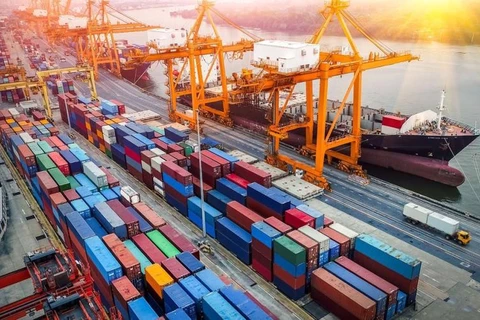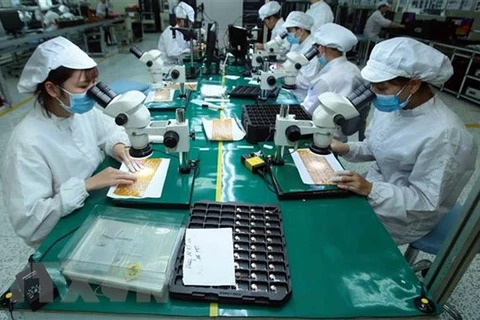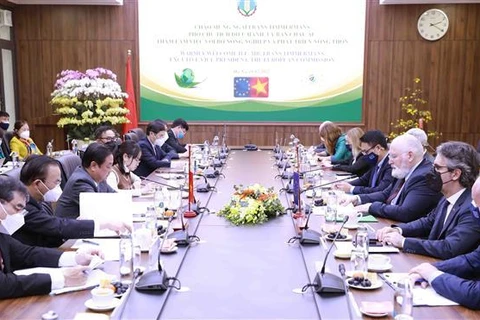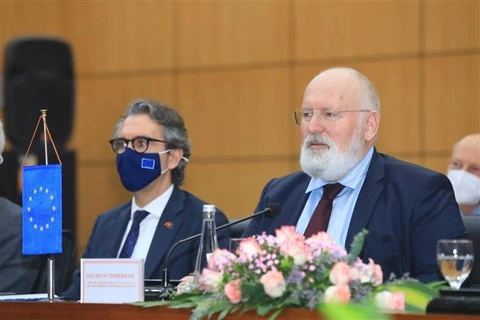 ASEAN Regional Integration Support – Vietnam Trade-Related Assistance (ARISE + Vietnam) is a project sponsored by the EU aiming to help the Vietnamese economy join the global supply chain through assistance for both public and private sectors. (Photo: VietnamPlus)
ASEAN Regional Integration Support – Vietnam Trade-Related Assistance (ARISE + Vietnam) is a project sponsored by the EU aiming to help the Vietnamese economy join the global supply chain through assistance for both public and private sectors. (Photo: VietnamPlus) Hanoi (VNA) – The European Union has bolstered support to help Vietnam improve effectiveness of the implementation and impacts of the EU-Vietnam Free Trade Agreement (EVFTA) to optimise opportunities brought by this pact.
Two years after the EVFTA took effect, the trade agreement has brought about positive results to Vietnam’s exports and imports.
As the economy gradually recovers after COVID-19 pandemic, the EU is assisting Vietnam with the evaluation of the EVFTA implementation and impacts.
Via a trade support project for Vietnam, the EU has committed to helping the Vietnamese Government fully carry out the EVFTA, notably tariff commitments, trade analysis and statistics.
Effectively realising tariff commitments
Since the EVFTA has taken effect, the EU has stepped up technical support for Vietnam to fully carry out the agreement.
Efforts aim to raise the capacity of Vietnamese Government officials and researchers in tariff transition, as well as the recognise the country’s tax commitments through trade data analysis in signed free trade agreements.
In late January, the EU-backed ARISE+ Vietnam together with the Ministry of Finance held a training course on Vietnam’s tariff transition from ASEAN Harmonised Tariff Nomenclature (AHTN) 2017 to the 2022 edition.
Thanks to these efforts, Vietnam is preparing for the changes in tariffs and completing its tax reduction roadmap set in the EVFTA.
According to the Ministry of Finance, a list of Vietnamese imports and exports is being compiled in accordance with the AHTN to update technology and trade and classify goods to match market demand.
Currently, Vietnam follows the AHTN, which is reviewed every five years in line with amendments to the Harmonised System (HS).
Therefore, it is important for Vietnam to apply the HS and the AHTN consistently and accurately to facilitate customs clearance.
Officials in the tax sector need to know the latest information on the new tariff system.
Evaluating the efficiency of the implementation of the deal
Under Article 17.14 of the EVFTA, available statistics on preference utilisation will be exchanged each year on July 1, creating a foundation for the two sides to evaluate the efficiency of the implementation of the deal.
Truong Thanh Ha, from the Department of International Cooperation under the Ministry of Finance, said the analysis and assessment of EVFTA impacts during the implementation helps Vietnam improve its supervision and fulfil its commitments.
The implementation of the EVFTA has produced positive results for the Vietnamese economy. To uphold such achievements, however, data and statistical analysis need to be further bolstered.
Through ARISE + Vietnam, the EU has launched a training course on trade data analysis to facilitate the implementation of free trade agreements for more than 30 officials from the Ministry of Finance, the Ministry of Industry and Trade, and the General Department of Customs.
The course is designed to improve the capacity of Vietnamese officials and researchers in trade data analysis and the evaluation of EVFTA implementation as well as its impacts.
Peter Bernhardt, the Team Leader of ARISE + Vietnam project, said economic research studies evaluating EVFTA impacts are of special significance to Vietnam as they help the country adjust its policies to ease negative impact and maximise the benefits under the agreement.
ARISE + Vietnam is a project funded by the EU to integrate Vietnam’s economy into the global production chain through targeted support to both public and private sectors. It will support the Vietnamese Government to reap the benefits of new bilateral and regional trade commitments, with a focus on the implementation of the EVFTA.
This is part of the ASEAN Regional Integration Support by the EU – ARISE Regional Programme– to provide trade related technical assistance to the region./.
























